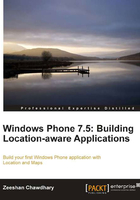
上QQ阅读APP看书,第一时间看更新
Buzzwords in the location-based industry
As the book deals with Windows Phone location-aware apps, it is a good time to understand the following buzzwords and key terms used in the location-based industry:
- Global Positioning System (GPS): A satellite system that provides global navigation data including location and time.
- Global Navigation Satellite System (GLONASS): Russian navigation system.
- Assisted GPS (A-GPS): A mobile network assisted GPS system that uses the mobile network as a fall-back in areas of poor GPS coverage.
- Geographic Information System (GIS): A system for storing, processing, and retrieving geographically-aware data, in addition to using user interface (usually raster map images) for easier management. A GIS typically involves both hardware and software.
- Spatial database: A database management system that is used for storing, querying, and fetching geotagged data, used in conjunction with GIS for data management.
- Geocodes: The latitude and longitude pair used to refer to a point on the earth's surface.
- Geocoding: The process of converting text addresses to geocodes using geocoding services such as GeoNames or Bing Maps API.
- Reverse geocoding: The process of converting geocodes to text addresses.
- Geofencing: The process of device-based alerts or notifications when entering a virtual geographical area. This geographic area can be a block, a lane, a neighborhood, a city, and so on, based on the application logic.
- Check-ins: These have been made popular by startup companies such as Foursquare and Footfeed. Checking-in refers to the process of confirming that you actually entered/checked-in to a place via a mobile phone app.
- Geotagging: The process of assigning geocodes (latitude-longitude pair values) to any news article, blog post, twitter tweet, or any other web action so that the location-based searches can be performed on them.
- Location-based advertising (LBA): A new paradigm in web and mobile ads that are triggered by the location of the mobile device. Location-specific adverts for deals, events, movies, shopping, and restaurants offers are all possible with LBA.
- Augmented reality (AR): AR is an exciting visual manipulation (augmentation) of the real-world environment (usually captured via mobile phone camera), combined with computer-generated (location-based) multimedia elements (pictures, audio, videos, 3D animation) usually in real time, giving users the perception of superimposition of computer-generated elements onto the real world.
- HTML5: The new version of the HyperText Markup Language that is under heavy development at W3C, and at browser companies such as Mozilla, Apple, Google, and Microsoft. HTML5 is poised to bring in a new and better way of writing HTML pages using standardized tags, which not only helps the web developers maintain code reusability but also makes it easy for search engines to semantically extract information from such HTML5 websites.